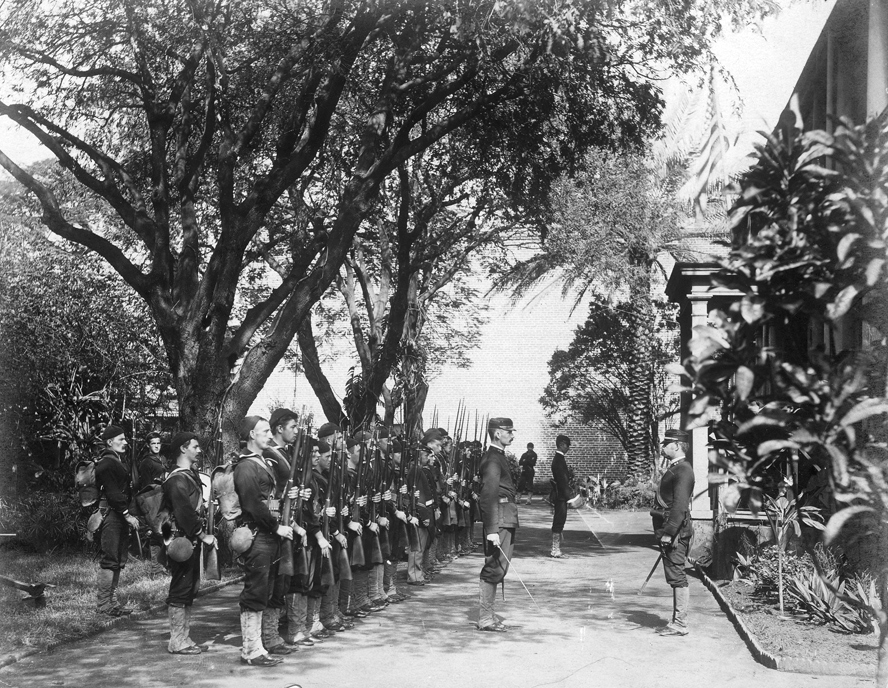
Overthrow of the Hawaiian Kingdom
The overthrow of the Hawaiian Kingdom was a coup d'état against Queen Liliʻuokalani, which took place on January 17, 1893, on the island of Oʻahu and led by the Committee of Safety, composed of seven foreign residents and six Hawaiian Kingdom subjects of American descent in Honolulu.[5][6] The Committee prevailed upon American minister John L. Stevens to call in the U.S. Marines to protect the national interest of the United States of America. The insurgents established the Republic of Hawaii, but their ultimate goal was the annexation of the islands to the United States, which occurred in 1898.
The 1993 Apology Resolution by the U.S. Congress concedes that "the overthrow of the Kingdom of Hawaii occurred with the active participation of agents and citizens of the United States and [...] the Native Hawaiian people never directly relinquished to the United States their claims to their inherent sovereignty as a people over their national lands, either through the Kingdom of Hawaii or through a plebiscite or referendum". Debates regarding the event play an important role in the Hawaiian sovereignty movement.
Response[edit]
United States[edit]
Newly inaugurated President Grover Cleveland called for an investigation into the overthrow. This investigation was conducted by former Congressman James Henderson Blount. Blount concluded in his report on July 17, 1893, "United States diplomatic and military representatives had abused their authority and were responsible for the change in government."[73] Minister Stevens was recalled, and the military commander of forces in Hawaiʻi was forced to resign his commission.[73] President Cleveland stated, "Substantial wrong has thus been done which a due regard for our national character as well as the rights of the injured people requires we should endeavor to repair the monarchy." Cleveland further stated in his 1893 State of the Union Address that, "Upon the facts developed it seemed to me the only honorable course for our Government to pursue was to undo the wrong that had been done by those representing us and to restore as far as practicable the status existing at the time of our forcible intervention."[74] The matter was referred by Cleveland to Congress on December 18, 1893, after the Queen refused to accept amnesty for the traitors as a condition of reinstatement.
The Senate Foreign Relations Committee, chaired by Senator John Tyler Morgan (D-Alabama) and composed mostly of senators in favor of annexation, initiated their own investigation to discredit Blount's earlier report, using pro-annexationist affidavits from Hawaii, and testimony provided to the U.S. Senate in Washington, D.C. The Morgan Report contradicted the Blount Report, and exonerated Minister Stevens and the U.S. military troops finding them "not guilty" of involvement in the overthrow. Cleveland became stalled with his earlier efforts to restore the queen and adopted a position of recognition of the so-called Provisional Government and the Republic of Hawaii which followed.[75][76]
The Native Hawaiian Study Commission of the United States Congress in its 1983 final report found no historical, legal, or moral obligation for the U.S. government to provide reparations, assistance, or group rights to Native Hawaiians.[77]
In 1993, the 100th anniversary of the overthrow of the Hawaiian Kingdom, Congress passed a resolution, which President Bill Clinton signed into law, offering an apology to Native Hawaiians on behalf of the United States for its involvement in the overthrow of the Hawaiian Kingdom. The law is known as the Apology Resolution, and represents one of the few times that the United States government has formally apologized for its actions.[78]
International[edit]
Every government with a diplomatic presence in Hawaii, except for the United Kingdom, recognized the Provisional Government within 48 hours of the overthrow via their consulates. Countries recognizing the new Provisional Government included Chile, Austria-Hungary, Mexico, Russia, the Netherlands, Imperial Germany, Sweden, Spain, Imperial Japan,[a] Italy, Portugal, Denmark, Belgium, China, Peru, and France.[79] When the Republic of Hawaii was declared on July 4, 1894, immediate de facto recognition was given by every nation with diplomatic relations with Hawaii, except for Britain, whose response came in November 1894.[80]